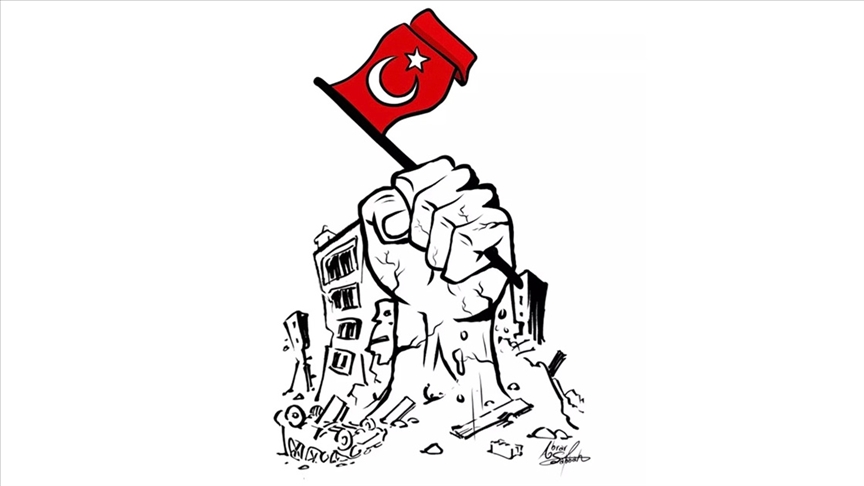The known history of Mecca dates back to the time of Prophet Abraham, but there is not much information about any earlier history. Prophet Abraham brought his son Ishmael, who was an infant, and his wife Hagar to Mecca on the order of Allah, leaving them there to return to Palestine.
The valley of Mecca is described as an "uncultivable valley" (Abraham 14/37), being a desert with a hot, dry climate. Thus, Hagar and Ishmael were soon thirsty. According to religious accounts, just as Hagar, who had been running between the Safa and Marwa Hills in order to find water, had become desperate and abandoned hope for her son's life, a source of water sprung from under the feet of her son. The source was an abundant spring called the zamzam and subsequently became a stopping-off place for caravans. After a certain time, the Jurhum tribe from Yemen settled in the outer sections of Mecca. Ishmael learned Arabic from them and married a girl from this tribe.
Prophet Abraham, who was living in Palestine, paid occasional visits to Hagar and Ishmael. On his third visit to Mecca, Prophet Abraham, in accordance with the order of Allah, began to construct the Kaaba with his son Ishmael. It can be understood from certain verses of the Holy Quran (al-Baqarah 2/127; Al-Imran 3/96; Al-Hajj 22/26) that the Kaaba had existed before the time of Abraham; however it had been destroyed and its location was obliterated over time until Prophet Abraham once again found its place and rebuilt it.1 Although there is no information about who built the Kaaba before Abraham, it is recorded in some sources that it was built by Prophet Adam or his son Seth. When Prophet Abraham completed the construction of the Kaaba, the Archangel Gabriel appeared to him and taught him how to perform the pilgrimage (hajj).
The administration of Mecca and the Kaaba, which had been the duty of Ishmael, passed to the Jurhum tribe after him. The Jurhum tribe first accepted the religion conveyed by Ishmael, but they deviated with time, performing immoral acts, stealing gifts that were brought to the Kaaba, and not treating the people who came to the city for pilgrimage well. After a certain time, the Khuza'ah tribe, which had migrated to Mecca from Southern Arabia, defeated the Jurhum tribe in a battle and removed them from the city. The Jurhum tribe returned back to Yemen, their homeland, after removing the Hajarul Aswad (Black Stone) from its place and covering over the zamzam well to disguise its location. The Ishmaelites did not take part in the battle, due to their small number, and they continued to stay in the city after concluding an agreement with the Khuza'ah tribe. Amr bin Luhay, one of the leading figures of the Khuza'ah tribe, broke the tradition of monotheism and allowed for the emergence of idolatry when he took over the administration of Mecca and the Kaaba.
Quraishis under the leadership of Qusay bin Kilab, an ancestor of Prophet Muhammad five generations removed, took over the administration of Mecca in the first part of the fifth century by after defeating the Khuza'ah tribe. Accordingly, the services of the Kaaba, which represented great honor and respect, passed to the Quraishis. Qusay gathered together the Quraishi branches, which were living around Mecca, and he placed them around the Kaaba. Also by performing the necessary regulations, Qusay gained control of the following services: the administration of Mecca (the administration of Darunnadwa-Council of the Meccan infidels) commander-in-chief (kiyada), flagmanship (liva), maintenance of the Kaaba, security of the Kaaba's door and keys (hijaba or sidana), supply of water to the pilgrims (sikaya), and accommodation for the pilgrims (rifada). The Darunnadwa which was built by him continued its existence up to the Islamic period as a meeting place where important issues were discussed and various ceremonies were held.
The administration of Mecca and the services of the Kaaba were continued by the descendants of Qusay bin Kilab after his death. Hashim bin Abdumanaf, the grandson of Qusay and an ancestor of Prophet Muhammad three generations removed, worked hard to provide food and water for both the pilgrims who came to Mecca and the Quraishi tribe. Hashim, known for his generosity, and his brothers Abdushems and Nawfal made trade agreements with Byzantium, Yemen, Ethiopia and Iran. They also signed nonaggression pacts with the tribes along the trade routes. Accordingly, trade in Mecca gained international importance. The Quraishis were able to make journeys for trade without threat to Yemen and Ethiopia in the winter, and to Syria and through Anatolia in the summer because of the prestige they had won from the performance of the Kaaba services. On his way to Syria, Hashim went to Yathrib (Medina) and stayed there for a while, marrying Salma, the daughter of Amr bin Zayd from Najjarian. Abdulmuttalib (Shayba), the grandfather of Prophet Muhammad, was their child. Hashim died in Gazza in Palestine during his travels, and he was buried there. Abdulmuttalib stayed in Medina for eight years and later was brought to Mecca by his uncle Muttalib. Abdulmuttalib was raised by his uncle and his uncle transferred the leadership of the tribe to him before his death. After a dream, Abdulmuttalib located the place of the zamzam well that had been covered by the Jurhum tribe before they left Mecca, and he reopened the well. He undertook the duty of bringing food and water to the pilgrims.
The religious and commercial importance of Mecca, in addition to its geographical location, caught the attention of states such as Byzantium, Iran (Sassanian) and Ethiopia. Abraha, the Yemeni governor of the kingdom of Ethiopia, built a church in San'a to try to prevent the visits of the Arabs to the Kaaba. When this attempt failed, he decided to destroy the Kaaba and abolish Mecca's status as a religious center by invading it and stopping the trade activities of the people there. Abraha and his army came as far as the area surrounding Mecca with his army and stayed there. The grandfather of Prophet Muhammad, Abdulmuttalib, who was the leader of the Hashimite branch of the Quraishis, met Abraha and reminded him that the Owner of the Kaaba, which was known as Baytullah (the House of Allah) would protect it. Abraha ordered his soldiers to strike, but the elephant in front of his army refused to take a step towards the Kaaba. According to Surah Fil (105/1-5) his army was destroyed by small stones that were dropped by birds flying overhead which had been sent by Allah. This incident was called the Incident of the Elephant, and the year in which it occurred was called the Year of the Elephant. The fact that Abraha's attempt failed caused the Arabs to give more importance to the pilgrimage than was ever seen before. As a result, the prestige of Mecca and the Quraishis was raised.
Mecca was the leading city of the three prominent cities of the Hejaz region, the other two being Yathrib (Medina) and Taif. Mecca, the intersection point on the roads that lead to Yemen to the south, the Mediterranean to the north, the Persian Gulf to the west, and the Red Sea port of Jeddah to the west, was located at an economically strategic point. Moreover, the Kaaba was located in the city, thus making the city the center of religion in Arabia. People from all parts of Arabia would come to visit the Kaaba during certain months of the year and trade activities would be heightened in the city. People would set up fair grounds and poetry competitions would be held. As Mecca was unsuitable for agriculture, due to geographical conditions, trade constituted the essence of business life.
Like the rest of the Arabian Peninsula in general, idolatry was also prevalent in Mecca. The number of idols in the Kaaba and its surroundings was 360; the biggest of these idols was Hubal, the most important Quraishi idol. In addition to this, there were idols in most of the houses. Arabs accepted that Allah was the creator and ruler of the skies and the earth, but they worshiped the idols, which they thought could bring them closer to Allah. They deviated from the monotheistic belief that commanded they worship Allah alone, and thus they committed the sin of shirka (idolatry) by associating partners with Allah. Yet, although their numbers were not great in Mecca, there were the Hanifs who still practiced the monotheistic belief that had been introduced by Prophet Abraham.









No comments:
Post a Comment